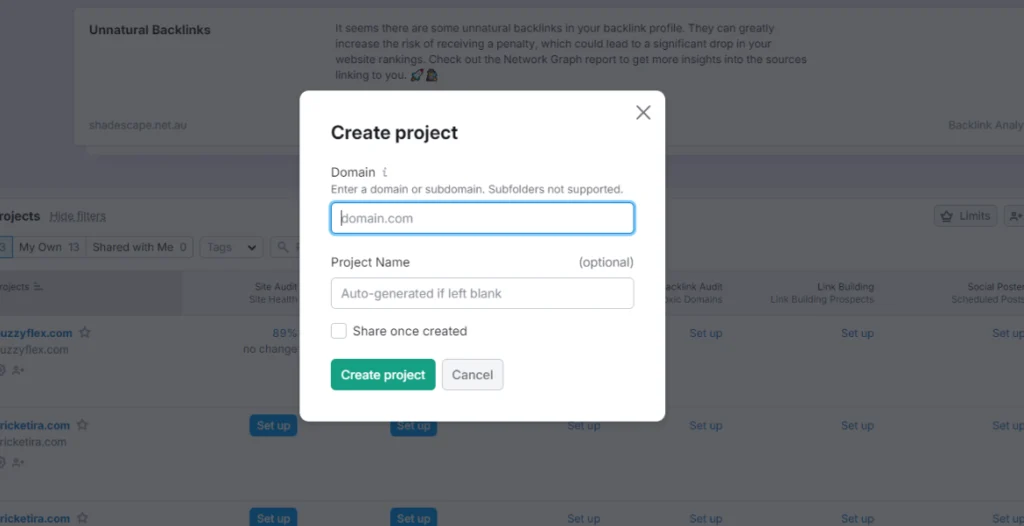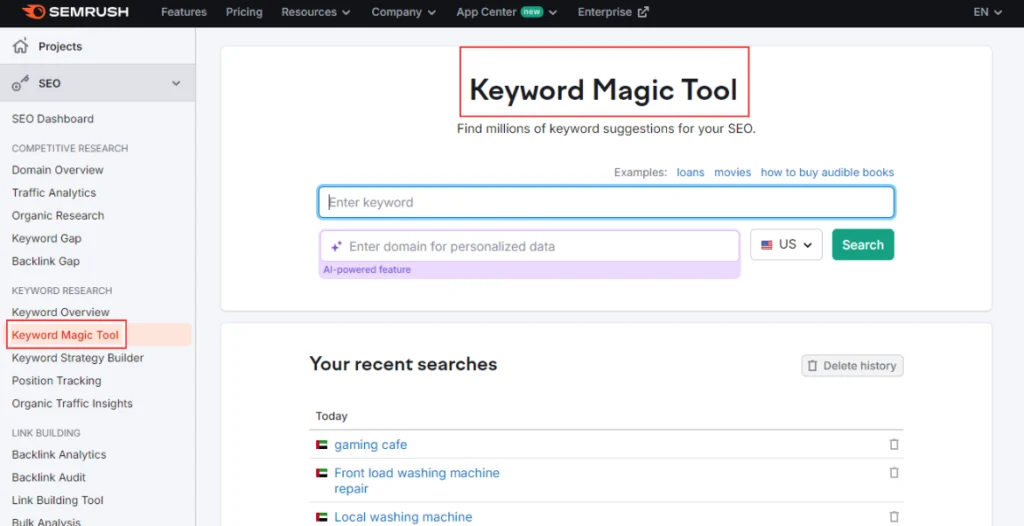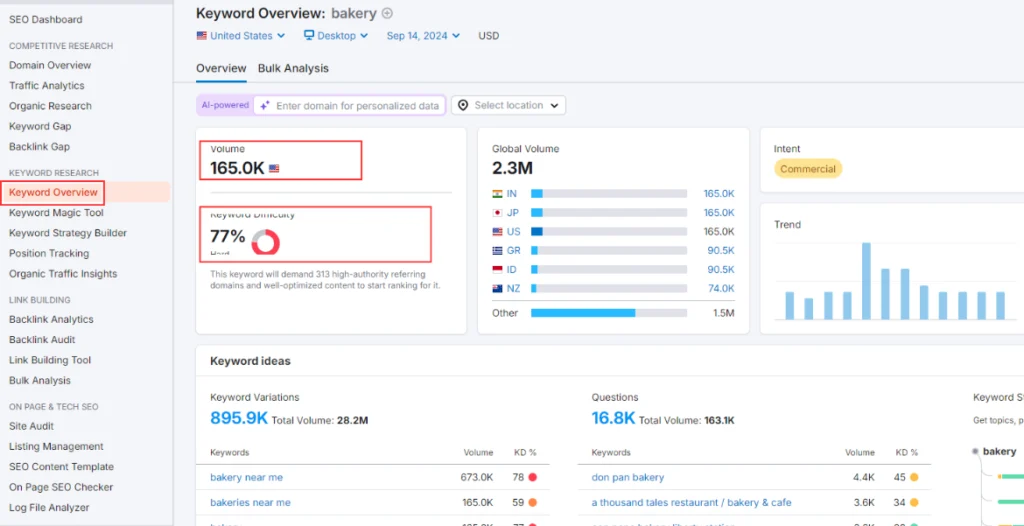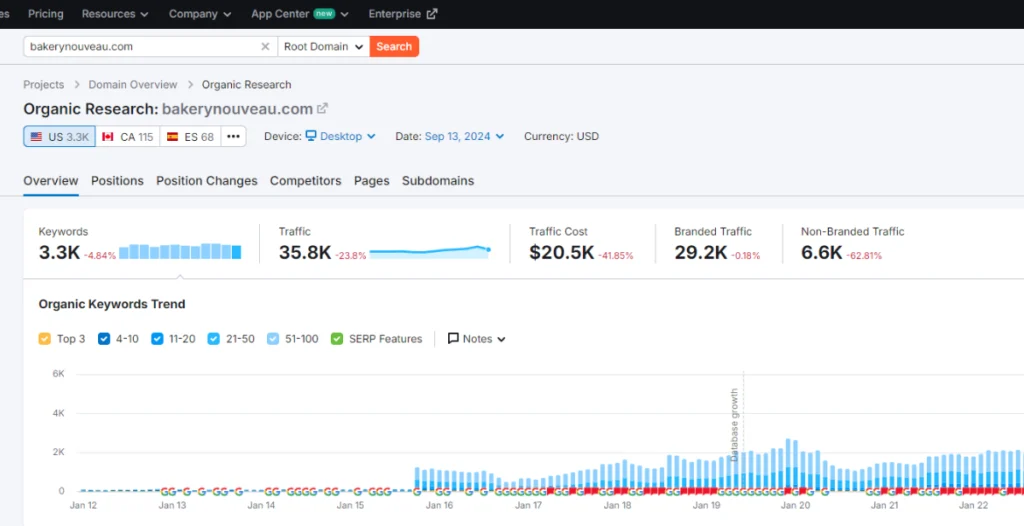Table of Contents
ToggleWhen you’re trying to dominate search results for your business, especially at a local level, having the right tools is key. SEMrush is one of the most powerful platforms available, helping businesses refine their SEO strategies.
But how exactly can you leverage it to search for local keywords? That’s what we’ll dive into today. Whether you’re targeting a city, region, or neighborhood, this guide will show you step-by-step how to find keywords that resonate with your local audience.
Why Local Keywords Matter
Why focus on local keywords? Local SEO ensures that your business gets visibility where it matters most—within your community. When someone searches “best coffee shop near me,” local businesses optimized for those keywords get prime visibility. It’s the difference between showing up in front of potential customers nearby and getting lost in a sea of irrelevant search results.
SEMrush as a Tool
SEMrush isn’t just a keyword research tool—it’s an all-encompassing SEO platform. While many use it for global SEO campaigns, it’s just as powerful for local searches. With features that let you filter by location, analyze competitors, and track performance, SEMrush gives you the edge in local SEO.
Get Started with SEO
Our expert SEO team is here to take the technical load away so you don’t need to worry about optimizing anymore.
Setting Up Your SEMrush Account
Creating a Project
To begin with SEMrush, you need to create a project for your business. This project acts as a central hub where all your keyword research, competitor analysis, and SEO tracking are managed. Here’s how to set it up:
- Log in to SEMrush: Start by logging into your SEMrush account. If you don’t have one yet, sign up for an account.
- Create a New Project: On the dashboard, navigate to the “Projects” section and click on “Create my first project” or “Add new project.”
- Enter Your Domain: Input your website’s domain name and give your project a relevant name (e.g., “Local SEO for [Your Business Name]”).
- Configure Project Settings: Follow the prompts to configure settings such as tracking the keywords you want to target, setting up site audits, and connecting to Google Analytics for enhanced data insights.

Navigating the SEMrush Dashboard
Once your project is set up, familiarize yourself with the SEMrush dashboard to make the most of the tool:
- Main Menu: The main menu on the left side provides access to various tools, including the Keyword Magic Tool, Site Audit, and Position Tracking.
- Overview Screen: This gives you a snapshot of your project’s performance, including keyword rankings, site health, and competitive analysis.
- Tools and Features: Explore the tools available within your project, such as keyword research, backlink analysis, and traffic insights. Each tool has its own set of features tailored for in-depth analysis.
What Are Local Keywords?
Local keywords are phrases that include specific geographic elements, like a city or region. For example, instead of “plumber services,” a local keyword would be “plumber services in Seattle.” These are critical for businesses that rely on local foot traffic or serve a specific area.
How Local Keywords Differ from General Keywords
Local keywords are more focused, catering to smaller, specific audiences. They often have lower search volumes than broader terms but are far more relevant to users looking for services nearby.
Local SEO vs General SEO
General SEO looks at the broader web, while local SEO zooms in on location-based search queries. Local SEO uses tools like Google My Business and focuses on things like local citations and reviews, but keyword research plays a crucial role here too.
Step-by-Step Guide to Searching Keywords Locally in SEMrush
Step 1: Select the Right Project
- Open SEMrush: Log in to your SEMrush account.
- Navigate to Your Project: Go to the “Projects” tab on the dashboard.
- Choose Your Project: Click on the project you’ve set up for local SEO research.
Step 2: Accessing the Keyword Magic Tool
- Locate the Tool: From the project dashboard, find and select the Keyword Magic Tool under the “Keyword Research” section.
- Enter a Broad Keyword: Type a general keyword related to your business into the search bar. For example, if you own a bakery, you might start with “bakery.”

Step 3: Adjusting Search Parameters for Local Results
- Set Geographic Location:
- Click on “Advanced Settings”: Within the Keyword Magic Tool, find the advanced settings option.
- Select Location: Choose the specific city, region, or country you’re targeting. This ensures the keyword results are tailored to the local area.
- Adjust Language Preferences:
- Set Language: If your target audience speaks a different language, adjust the language settings to match.
- Filter Results:
- Use Filters: Apply filters to refine your results based on metrics like search volume, keyword difficulty, and more. This helps you focus on keywords that are most relevant to your local market.
- Analyze Keyword Suggestions:
- Review the List: SEMrush will generate a list of keyword suggestions based on your input and settings.
- Evaluate Metrics: Look at metrics such as search volume, keyword difficulty, and CPC (cost per click) to determine which keywords are most valuable for your local SEO strategy.
Not sure about setting up search parameters?
Don’t miss out on local analytics. Let us take care of adjusting search parameters for local results.
Analyzing Your Local Keyword Results
Once you’ve gathered a list of local keywords using SEMrush, the next crucial step is to analyze these results to ensure they align with your SEO strategy and business goals. Here’s how to effectively analyze your local keyword data:
Keyword Difficulty
- Understand Difficulty Scores: Keyword difficulty scores indicate how challenging it will be to rank for a particular keyword. This is usually expressed as a percentage.
- Low Difficulty: Easier to rank for, especially if your website is relatively new or has lower authority.
- High Difficulty: Requires more effort and possibly higher-quality content and backlinks.
- Assess Your Resources: If a keyword has a high difficulty score, evaluate if you have the resources to compete. Consider focusing on lower-difficulty keywords if your site is new or has limited authority.
Search Volume
- Check Monthly Searches: The search volume shows how many people are searching for a keyword each month.
- High Volume: Keywords with high search volume are generally more competitive but can drive more traffic.
- Low Volume: Keywords with lower search volume might attract a smaller but more targeted audience.
- Balance Search Volume and Relevance: Aim for keywords with a good balance of search volume and relevance to your local market. Sometimes, a lower-volume keyword may be more effective if it closely matches user intent.

Competitive Density
- Analyze Paid Competition: Competitive density shows how many advertisers are bidding on a keyword in paid search campaigns.
- High Density: Indicates that many businesses are competing for the keyword, which may make it more challenging to achieve high organic rankings.
- Low Density: Fewer advertisers mean less competition, potentially making it easier to rank organically.
- Consider Your Strategy: If a keyword has high competitive density, you might need to invest in more content and link-building efforts to compete effectively.
Practical Tips for Analyzing Local Keywords
- Prioritize Local Relevance: Ensure the keywords you choose are not only popular but also relevant to your specific geographic area. Keywords should reflect local search intent and user behavior.
- Use Long-Tail Keywords: Focus on long-tail keywords (phrases with three or more words) as they often have lower competition and higher conversion rates, especially in local searches.
- Monitor Trends: Keep an eye on changing trends in your local market and adjust your keyword strategy accordingly. SEMrush’s keyword tracking features can help you stay updated.
Using SEMrush to Analyze Competitors’ Local SEO
Analyzing your competitors’ local SEO strategies can provide valuable insights and help you identify opportunities to outperform them. SEMrush offers robust tools for competitor analysis, allowing you to understand their keyword strategies, backlink profiles, and overall SEO performance. Here’s how to use SEMrush to analyze your competitors’ local SEO:
Finding Competitors in Your Local Area
- Identify Your Competitors:
- Manual Search: Conduct a manual search using local keywords related to your business. Note which businesses consistently appear in the top results. These are your primary competitors.
- SEMrush Competitor Analysis: Enter the domain of a known competitor into SEMrush’s Domain Overview tool. This provides a snapshot of their online presence and identifies other competitors based on shared keywords.
- Set Up Competitor Tracking:
- Create a Competitor List: In SEMrush, you can set up a list of competitors to track. Go to the “Competitors” tab in your project and add domains of local competitors to monitor their SEO activities.
Analyzing Competitors' Local Keywords
- Use the Domain Overview Tool:
- Enter Competitor’s Domain: Input a competitor’s domain into the Domain Overview tool to see a comprehensive analysis of their organic search performance.
- Check Organic Keywords: Review the list of keywords for which the competitor ranks. Pay attention to those with high search volume and relevance to your local market.
- Explore the Organic Research Tool:
- View Top Keywords: Go to the Organic Research section to see a detailed breakdown of a competitor’s top-performing keywords.
- Filter by Location: Adjust the settings to filter keywords based on location. This helps in understanding how competitors are targeting local searches.
- Analyze Keyword Gaps:
- Compare Keywords: Use the Keyword Gap tool to compare your keyword profile with those of your competitors. This tool helps identify keywords that your competitors are ranking for but you are not.
- Identify Opportunities: Focus on the keywords that your competitors are missing but are relevant to your local market. This presents opportunities for you to target those gaps.
Reviewing Competitors' Backlink Profiles
- Check Backlink Analytics:
- Enter Competitor’s Domain: Use the Backlink Analytics tool to analyze the backlink profile of your competitors.
- Examine Link Quality and Quantity: Look at the number, quality, and types of backlinks pointing to your competitor’s site. This helps understand their link-building strategy and domain authority.
- Analyze Local Citations:
- Find Local Citations: Identify local business directories and citation sources that link to your competitors. Ensure your business is listed in these directories to improve your local SEO.
Monitoring Competitor Performance
- Set Up Position Tracking:
- Track Competitor Rankings: Use the Position Tracking tool to monitor how competitors rank for specific local keywords over time. This helps gauge their performance and adjust your strategy accordingly.
- Regularly Review Competitor Reports:
- Monitor Changes: Regularly check for updates in your competitors’ SEO performance. SEMrush provides ongoing insights that can help you stay ahead of local competition.

How to Handle Multiple Locations
Managing SEO for multiple locations requires a strategic approach to ensure that each location is effectively targeted and optimized. Here’s how to handle it:
- Create Location-Specific Pages:
- Dedicated Pages: Develop separate landing pages for each location with unique content tailored to the local audience. Include local keywords, address details, and location-specific services.
- Optimize Local Listings:
- Google My Business: Set up and optimize a Google My Business listing for each location. Ensure each listing has accurate and consistent information, such as address, phone number, and hours of operation.
- Local Keywords:
- Keyword Variation: Use SEMrush to find and incorporate keywords specific to each location. Ensure that keywords reflect the unique aspects of each area to target local search intent effectively.
- Maintain Consistent NAP:
- Consistency is Key: Ensure that your Name, Address, and Phone number (NAP) are consistent across all online platforms and directories for each location.
- Leverage Local Reviews:
- Encourage Reviews: Request and manage reviews from customers at each location. Positive reviews enhance local credibility and improve rankings in local search results.
- Track Performance:
- Monitor Results: Use SEMrush’s position tracking and reporting tools to monitor the performance of each location’s SEO efforts. Adjust strategies based on performance data and local trends.
Exporting Your Local Keyword Research Results
How to Export Data from SEMrush
Exporting your keyword research is essential for planning content, creating ad campaigns, or sharing insights with your team. SEMrush allows you to download keyword lists in CSV or Excel formats easily.
Creating Keyword Lists for Future Campaigns
Once exported, you can organize your keywords by relevance, volume, or competition, creating tailored lists for different campaigns or content ideas.
Best Practices for Local Keyword Research in SEMrush
Target Specific Geographies:
- Be Precise: Focus on specific cities, neighborhoods, or even zip codes relevant to your business. This ensures your keywords are highly relevant to your local audience.
Use Long-Tail Keywords:
- Go Beyond Broad Terms: Incorporate multi-word phrases that include local landmarks or specific services. Long-tail keywords often face less competition and attract more targeted traffic.
Check Local Search Volume:
- Prioritize Volume: Choose keywords with a decent search volume that reflects local demand. SEMrush’s keyword tools allow you to filter results based on geographic and search volume data.
Analyze Competitors’ Keywords:
- Identify Gaps: Use SEMrush’s competitor analysis tools to discover keywords your competitors are ranking for that you are not. This helps in identifying potential opportunities.
Monitor Keyword Trends:
- Stay Updated: Regularly review keyword trends and performance data to adapt your strategy based on shifts in local search behavior and market changes.
Incorporate User Intent:
- Focus on Intent: Ensure the keywords align with local searcher intent, whether they’re looking to buy, find information, or visit a physical location.
Optimize for Local SEO:
- Match Keywords with Content: Use the chosen local keywords to optimize your website content, meta descriptions, and local business listings to improve relevance and visibility.
Stuck With Some Semrush Issue?
We can help you out! Get accurate keywords and data on your site today.
Conclusion
Local SEO is crucial for businesses looking to make a meaningful impact within their community. By using SEMrush effectively, you can uncover valuable local keywords, understand your competitors, and optimize your content to attract local customers.
However, navigating the complexities of local SEO and keyword research can be challenging, especially with the ever-evolving landscape of search algorithms and competition. That’s where expert assistance can make a significant difference.
If you’re looking to enhance your local SEO strategy without the hassle, consider partnering with Go SEO Monkey’s organic SEO services. With our proven expertise, we can help you harness the full potential of local keyword research, optimize your online presence, and drive targeted traffic to your business.
FAQs
- How do I filter keywords for a specific city?
You can filter keywords by location using the geographic settings in the Keyword Magic Tool. Simply select the city you’re targeting. - Can SEMrush help with small-town keyword searches?
Yes, SEMrush can target specific towns or even neighborhoods, making it an excellent tool for businesses in smaller markets - How do I find local search keywords?
To find local search keywords, use SEMrush’s Keyword Magic Tool, set the geographic location to your target area, and analyze the keyword suggestions for local relevance. - How to target local keywords?
Target local keywords by incorporating specific geographic terms in your content, optimizing your website for local searches, and using local business listings and citations. - How do I search for new keywords on SEMrush?
Use SEMrush’s Keyword Magic Tool to explore new keyword opportunities. Enter a broad term, adjust search parameters, and filter results based on location and relevance. - What is localized SEO?
Localized SEO focuses on optimizing your website and online presence to rank higher in local search results. It involves targeting location-specific keywords and improving visibility for local searches..





